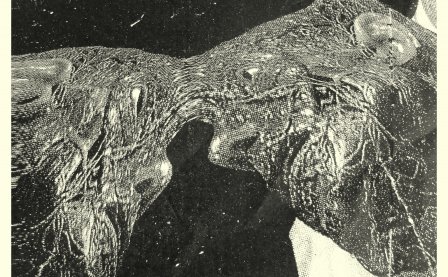The most striking thing about This Is Always Where You’ve Lived, the debut album from Secret Boyfriend, is how varied it sounds within the confides of a distinct aesthetic. The album weaves acoustic folk strings with a violent, static tapestry, as though Ryan Martin — the man behind the project — is constantly at war with an external force, as though he’s swimming against an arduous current of distortion that rocks and cradles his assortment of somber and gritted melodies.
Secret Boyfriend started life as a tongue-in-cheek, one-man show back in 2005. Having distributed a limited run of cassettes, founded his own Hot Releases label, and built a reputation through harsh noise shows in his hometown of Carrobo, NC, it came as quite a surprise that Martin would be releasing his long-awaited full-length on the independent UK label Blackest Ever Black. Kiran Sande’s imprint has altered its image markedly over the last 12 months, from a distribution channel with an evidently dark-techno focus to an operation that’s also primed toward a broader palate, such as the electro-acoustic assault of Shampoo Boy and the gothic breakbeats of Dalhous. Martin fits comfortably into the roster’s recent direction, where his experimentation with magnetic tape, distortion, and acoustic strings merge to create an ambience that’s not only dank and melancholic, but also teeming with ideas on vocal manipulation and the layering of instruments amidst a backdrop of feedback.
Although they differ substantially in structure, these songs come housed in a scuffed claustrophobia, where the tone twists and tangles about the static spheres that surround. It allows for the unease felt in the course of a harsh noise set to retain a presence in the context of material that’s otherwise softly pressed. Take the insular and brittle folk of “Glint and Glow,” which melds delicate, tapped percussion with gentle strings and a soft background hiss; “I’m here with you,” Martin whispers before trespassing into the fragile amp snaps of “Have You Heard About This House?” Alongside a haunted reserve of instrumentals, the record’s latter section provides a wonderful example of the artist moving away from the abrasive nature of extreme music to find himself on a subtler path: the violence is still there, but it sizzles under the surface in a fashion that’s detached from the musician’s vocals. This before the snarling tumult of the album’s titular track.
In a recent interview with Jane Chardiet for Noisey, Martin talked about attaining a notion of discomfort during his live show; this ranges from punching a cymbal that’s been placed across his face to drawing blood in front of an audience. “I like that you are struggling with an object and sometimes it is hurting you.” This sense of self-inflicted injury bleeds into the music with astounding impact. Whether it’s the fragmented chime of “Deleted Hill” or the blistering choral seizure of “Flashback,” there’s a feeling of displacement and struggle that’s utterly mesmerizing, regardless of any genre attribution.
Martin makes categorization seem irrelevant because of the atmosphere that emerges from each song; their presence presides over any signifiers that give them their aesthetic dimensions. The sawed-off guitar hook on the album closer is one of the most aggressive pieces on here; it’s hinged on manual repetition as opposed to a digital loop, bearing a guttural thrust that sits somewhere between black metal and harsh noise. By means of contrast, “Last Town” is a spacious, ambient offering, which realigns the tension by transforming it into a painful hush. While the mood remains acute and strained, the dynamics of each recording are worlds apart.
This Is Always Where You’ve Lived exposes a non-conformist approach that pulls together a set of intimate tracks, which are powerful in their collective potency. There is no brute force to their composure, but an underlying corrosive edge that’s every bit as intense as the next noise performance, if not more so. Although it might appear to be one of the most tender and personal recordings to come out of the Blackest roster, it’s also one of the most cutting — an outstanding debut that will have you obsessively looking over your shoulder.
More about: Secret Boyfriend




